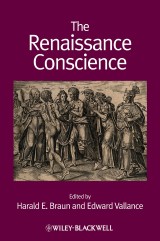Details

The Renaissance Conscience
1. Aufl.
|
21,99 € |
|
| Verlag: | Wiley-Blackwell |
| Format: | |
| Veröffentl.: | 03.05.2011 |
| ISBN/EAN: | 9781444396782 |
| Sprache: | englisch |
| Anzahl Seiten: | 176 |
DRM-geschütztes eBook, Sie benötigen z.B. Adobe Digital Editions und eine Adobe ID zum Lesen.
Beschreibungen
This book presents one of the first studies of the Renaissance notion of conscience, through examining theological manuals, legal treatises, letters and other sources of the period. <ul> <li>Represents one of the few modern studies exploring developments in scholastic and Renaissance notions of conscience</li> <li>Synthesizes literary, theological and historical approaches</li> <li>Presents case studies from England and the Hispanic World that reveal shared traditions, strategies, and conclusions regarding moral uncertainty</li> <li>Sheds new light on the crises of conscience of ordinary people, as well as prominent individuals such as Thomas More</li> <li>Offers new research on the ways practical theologians in England, Spain, and France participated in political debate and interacted with secular counsellors and princes</li> </ul>
Notes on contributors ix <p>Introduction (<i>H</i><i>arald E. Braun and Edward V</i><i>allance</i>) 1</p> <p>1 Jean Gerson, moral certainty and the Renaissance of ancient Scepticism (<i>R</i><i>udolf Schü</i><i>ssler</i>) 11</p> <p>2 Conscience and the law in Thomas More (<i>B</i><i>rian C</i><i>ummings</i>) 29</p> <p>3 'Guided By God' beyond the Chilean frontier: the travelling early modern European conscience (<i>A</i><i>ndrew R</i><i>edden</i>) 52</p> <p>4 Shakespeare's open consciences (<i>C</i><i>hristopher T</i><i>ilmouth</i>) 67</p> <p>5 Women's letters, literature and conscience in sixteenth-century England (<i>J</i><i>ames D</i><i>aybell</i>) 82</p> <p>6 The dangers of prudence: salus populi suprema lex, Robert Sanderson, and the 'Case of the Liturgy' (<i>E</i><i>dward V</i><i>allance</i>) 100</p> <p>7 The Bible, reason of state, and the royal conscience: Juan Márquez’s <i>El governador christiano</i> (<i>Harald E. B</i><i>raun</i>) 118</p> <p>8 Spin doctor of conscience? The royal confessor and the Christian prince (<i>N</i><i>icole R</i><i>einhardt</i>) 134</p> <p>Index 157</p>
<p>“Conscience is unquestionably a key word and concept during the period this book covers and it is illuminating to be reminded of the diversity of contexts in which it figured. At the same time, the editors’ expression of diffidence about one aspect of their project—they ‘‘hope’’ that the authors’ ‘‘reflections’’ will contribute to ‘‘our still modest knowledge’’ (10) — may be more broadly apt.” (<i>Renaissance Quarterly</i>, 1 July 2012)</p> <p> </p>
<b>Harald E. Braun</b> is Lecturer in European History (1300-1700) at the University of Liverpool. His publications include <i>Juan de Mariana SJ (1535-1624)</i> and <i>Early Modern Spanish Political Thought (2007).</i> <p><b>Edward Vallance</b> is Reader in Early Modern History at London's Roehampton University. His most recent publication is A <i>Radical History of Britain: Visionaries, Rebels and Revolutionaries, the Men and Women Who Fought for Our Freedoms (2009).</i></p>
<i>The Renaissance Conscience</i> presents one of the first modern studies to explore the variety of ways in which people during the Renaissance conversed with - and let themselves be guided by - their conscience. Through the careful examination of a wide range of extant sources including theological manuals, legal treatises, letters, and literary and autobiographical texts, the authors illustrate how individuals in England and the Hispanic world during the period of the Renaissance sought to reconcile their private and public selves, and thus establish and protect their identity. Individual essays demonstrate the significance, diversity, and fluidity of notions of conscience in the early modern world. These thought-provoking case studies also reveal how authority figures and commoners from two distinct cultural spheres struggled with similar issues and did so with explicit reference to shared scholastic and humanist traditions - often with similar outcomes. <i>The Renaissance Conscience</i> sheds important new light on the ways in which medieval and Renaissance discourses on conscience impacted upon early modern life and anticipated contemporary notions of moral autonomy.


















